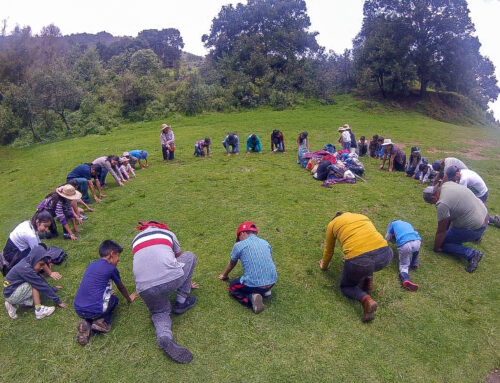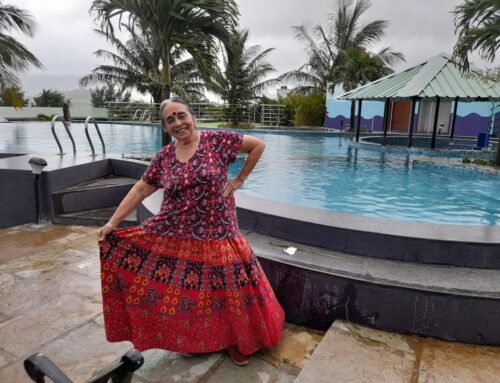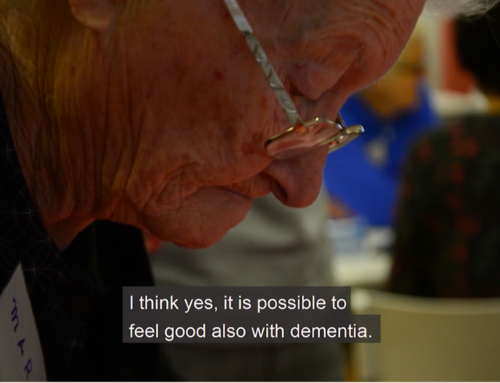Maldisposta. Feeling unwell, a kind of general not-feeling-so-good, mostly associated with indigestion, fatigue, aches, lightheadedness, brain fog, and other symptoms. It can also mean “feeling bad,” or feeling irritable, or being in a “bad mood,” depending on the context. Many of my elderly interlocutors complained of this affliction on an almost daily basis at the Santo António Social Senior Center, one of my field sites in Lisbon, which is both a Catholic parochial day center and “night center” (a sort of temporary recuperation or nursing home).
Amélia, a resident of the Night Center since late 2020, often rubbed her belly, frowned, and said under her breath, “Ai… estou maldisposta –“I’m not feeling well.” She would try to relieve this feeling by drinking sparkling water, sometimes eating crackers or digestive cookies. Other elderly residents and Day Center members, and predominantly the women, would cite the same issue. Marta, another resident whom Amélia often despised, would say the same thing, around the same times throughout the day. Whether or not the Center’s kitchen was involved, it seemed as if it could be, in some form, a communicable unwellness that permeated bodies of elderly women, sometimes seeming empathetic, sometimes not.
Amélia’s feeling maldisposta was a common utterance. Though she had a multitude of diagnosed illnesses, including depression, acid reflux, chronic pain, an amorphous “dementia” diagnosis, and was on numerous medications to treat them, the symptom of feeling maldisposta persistently remained. Her daughter-in-law, who also ran the Center’s kitchen, believed the sparkling water was what gave her indigestion and made her feel unwell – while the predominantly working-class Portuguese, Cape Verdean, and Brazilian women caregivers believed it to be a sustained and suspended grief. Being maldisposta seemed to be borne of a profound loneliness associated with the grief of her husband’s death. Her inability to attend his funeral due to COVID-19 protections and the Center’s silence surrounding his death forced her to contend with his loss (and the loss of her home and lifestyle) alone. Taking daily medications to stabilize her mood and various bodily functions maintained the materiality of her body, but left her in a state of chronic unwellness. Earlier in my fieldwork, another elder interlocutor, Sofia, suffered from this affliction as well – rather vocally. This general feeling almost appeared infectious.
I seek to analyze this phenomenon through the lens of interembodiment (Bunkley 2022), looking at how vague and banal unwell-ness becomes communicable, not just through similar experiences of aging and loss, diagnoses and prescriptions based on Portuguese medical notions of aging, but also because of a closeness and locality in which life at this Center is lived collectively. Here, interembodiment is produced through emotional, affective, and physical proximity and the processes of “undoing” that often happen to individuals at the end of life. Feeling maldisposta would sometimes bond or increase bonds between women, appearing as a symptom of shared grief, uncertainty, loss, frustration, and care in the daily life of the Center. Because of its temporary care status, the Night Center was always changing – residents and illnesses came and went. Yet maldisposta always remained.
This manifestation of interembodied uncertainty proliferated, even and perhaps especially, throughout the simultaneous COVID-19 pandemic at the Santo António Social Senior Center. The coronavirus itself is also pertinent here as a biologically infectious disease and mass disabling event, where the elderly were the most vulnerable and at-risk population for infection and death. And even when my elder interlocutors were separated and isolated in their bedrooms during Center lockdowns, similar maldisposta symptoms continued to be presented, and again when they were able to reconvene in common living spaces. I will show the situated context and depth of this generic affliction in my essay by connecting the experiences of feeling maldisposta in old age.
In the context of the complex, differing, yet shared experience of aging that I bore witness to in my fieldsite, I see Bunkley’s insightful and critical concept of “interembodiment” (2022) particularly useful in connection to Sarah Pinto’s notion of “undoing” (2014). Pinto sees practices and forms of undoing in terms of kinship, familial and medical care, and cases in which her interlocutors’ lives were undone by divorce, loss of home, loss of–and often abrupt changes to–families, and medical diagnoses (2014, 187). Pinto notes the intersections at which institutions of care and family have reorganized the role of the caretaker, the significance of loss, grief, and abandonment, and who has the responsibility to treat, heal, and care.
In Portugal, the family’s significance as a dependable nexus of care is being reformulated as the state’s insistence on neoliberal active aging campaigns increases. The Santo António’s temporary care center for elder recuperation and caregiver respite is morphing into more of a nursing home without the proper medical care, training, or equipment; it attempts to solve the issue of family care while trying to sustain it. The state’s insistence on active aging infrastructure also lends itself to the over-prescription of medication, not always covered by the National Health Service (Serviço Nacional de Saúde – SNS), further exasperating low pensions and low family income. Meanwhile, the Catholic morality of elder welfare care as charitable also ties into the same neoliberalization and privatization of that care, entangled as it is with Portugal’s history of charity via colonization and domination.
But these are also global problems. Access to healthcare, to living wages for adult children of the elderly, low pensions, and rising costs of rent, food, electricity, and other living expenses are international and eventual results of late global capitalism. The issues of inflation, housing and food insecurity, and a difficulty accessing medications, mental health services, and other forms of care in sites of neoliberal governance are a globalized phenomenon in their interconnectedness. Portugal, though a unique context in how uncertainty and insecurity have come to define the lives of many elderly people, is one country of many facing an aging population crisis, housing crisis, and infrastructural failures that have also rendered visible the effects of climate change. The inaccessibility of many of Lisbon’s buildings, its steep hills, and increasing cases of flooded homes during the fall and winter months are both infrastructural and environmental problems arising to meet other challenges of aging in an older city–reflected in many urban centers around the world.
Amélia’s becoming undone by the severe losses of her husband and her home, of her independence, of her sense of well-being and safety during a pandemic in which her age group is most at risk, is not the only undoing. Her subject position of wife, but also of mother, mother-in-law, and grandmother also changed with her move to the Center, highlighting issues within the family that would lead her to feel abandoned by her adult children but also guiltyand fearful of disrupting their lives that have seemed to move on without her. Familial relationships have been transformed by the rising cost of living and low salaries, making connections slip easily through the cracks when one family member is institutionalized. As we will see later in this piece, other elderly women were also affected by this feeling of being maldisposta. Marta’s undoing by her loss of control in daily life, and Sofia’s undoing via her ever-increasingly uncertain future are fundamental aspects to their feeling chronically maldispostas, within and beyond the specificities of the Center itself. This phenomenon of interembodiment, of a communicability of unwellness in the Center is based in various processes of undoing, with individual, familial, senior center, and larger social, historical, economic, and political forces at play.
Amélia entered the Santo António Social Senior Center in November 2020 with her late husband, Joaquim. They shared a room, an expensive suite with their own bathroom. He had a urological illness that was never specified, and he was ailing. Amélia, on the other hand, had a fractured spine and ribs from a terrible fall at home, and wore a back brace for a few months. Her condition improved, yet his declined. By late July 2021, Joaquim had passed away. Amélia was moved into a triple room, where she would continue to live indefinitely, and where she was roommates with both Marta and Sofia at different times. Her entire world suddenly changed drastically in the course of several months. Her move to the Center with Joaquim was difficult, and they had to adapt while dealing with illness, injury, and loss, where they had to adapt to life in a smaller, controlled, and surveilled space. But they had planned to return home – this was supposed to be a temporary solution to the new level of care required by their changing health circumstances.
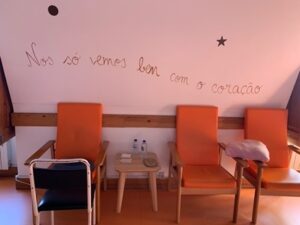
Santo António Senior Social Center’s Night Center Living Room 1. Photo by the author.
After Joaquim passed away, Amélia felt that she would die at the Center too. Her immense grief was often kept silent. Because of COVID-19, she could not attend her husband’s funeral, despite having taken the vaccine. He was cremated, and the service took place at the Center’s parent church, just down the hill. The family attended the funerary rites as Joaquim’s death became more of a bureaucratic event for the Center, and less like the world-shattering crisis experienced by Amélia. It appears that her being left out of a significant part of the grieving process made her clinically depressed. She has since been frequently referred to in clinical records as having “depressive syndrome,” as well as “dementia syndrome” –a diagnosis that no one, including the social workers, seems to understand. These diagnoses get passed from document to document with every medical appointment or hospital visit she has had since, many of which are due to heart, lung, and gut problems now that her back has healed. The number of prescriptions in her file have increased since losing her husband, and the diagnosis of the “dementia syndrome” only appears in her medical history after 2020, and after his death.
I am inclined to think, here, about the significance of the biological and sociocultural-historical context in which bodies move, feel, think, and are in relation to other bodies, institutions, and worlds. Amélia’s distress at the idea of dying at the Center, just like her husband, is fraught with an anxiety of the uncertainty of life and death in old age. Just as she saw her husband ail and wither away, to appear to be discarded so unceremoniously, and then fall absent from the lives of the living inspired such fear in her–that the same would happen, without warning, just as her dramatic move to the Center in the first place. This dread and agony associated with this grief, also inspires a feeling of being maldisposta. With more uneasy feelings around death, and the topic of grief, the more mineral, fizzy water she drinks.
Moreover, the medications dispensed by caregivers and the food provided by the Center (by her daughter-in-law who works for a contracted company, not directly for the Center itself), may affect her biology as well. The Center’s struggling finances and its acceptance of wilting perishables from the city’s food banks may also affect this. The reality of the Center’s position as a Catholic care institution, existing both on private and public funds, in a neoliberal system that does not value the lives of the elderly, is something that also affects the Center’s “utentes,” or patient-client-members, like Amélia, Marta, and Sofia. Other significant local influences contribute as well. The strain of living in a chronically stressful place on mental and physical health are apparent, especially as the Center re-expanded its services as COVID-19 protections lessened in 2022, and then began to accept more dependent elders while caregivers became less trained, chronically underpaid, and struggled with the worsening layoffs as state pandemic funding waned. The institutional, familial, social, historical, and biological aspects of life all coalesce in a way that makes one’s feeling maldisposta into something far more complex, and particularly local.
Amélia’s anxiety, fear, and grief are embodied in her daily life, but not just in her alone. Uncertainty and loss have an interembodied effect and affect for other elders in this Center as well. Sofia and Marta’s feeling maldispostas is also tied to and interlocks with Amélia’s. Though each person’s experiences of aging is different, with different familial dynamics, injuries or illnesses that led them there, medications, financial precarity, and gendered aging, each experienced a chronic unwellness specific to this Center that I did not see particularly exemplified elsewhere.
With Marta’s maldisposta symptoms, including indigestion, fatigue, chronic pain, and irritability, she often noted the meals served. She was frustrated by the saltiness of the food, its presentation, whether it contained fried food, and its freshness, or lack thereof. Her constant bickering with Amélia when they did talk to each other resulted in a duality of shared experience: notably, that they were each annoyed by the complaints of each other, of feeling, maldisposta. Sitting for hours in the same chairs, not feeling up to chatting most of the time, and concerned for how their laundry was being washed and maintained, they shared many of the same objectives, concerns, feelings, and affective states. Fear of abandonment and death reached across them, as they sat apart. Typically, Amélia would already have been maldisposta before sitting down in her usual chair, sometimes even mentioning it on her routine walk to the bathroom first thing in the morning. Other times it was later in the day. But once she sat in her chair, it would often become a refrain that would be almost immediately echoed by Marta–both rubbing their bellies. And it would often go the other way too, with Marta mentioning her symptoms first, remarking on her own feeling of being maldisposta, and then it would be reiterated across the living room by Amélia as herself having the same affliction, at almost the same time. But talking about it at a particular time does not necessarily mean that it began at that moment for either. It appeared continuously contagious. Their feeling maldisposta seemed to stretch across time, between one another, back and forth, in the space of the Center.
Though Marta’s experience of aging and loss has been different than Amélia’s, she also grieves the loss of her husband from over a decade ago, while also lamenting the painful distance from her adult children, with whom she is quite close. She struggles with the undoing loss of control of her daily life, diet, and activities as she accepts her limited mobility because of severe arthritis and slow healing after breaking her hip a couple months prior. Her frustration at her loss of self-control in terms of her body and its maintenance, her daily schedule, and goings-on was a major contributor to her feeling unwell, not just the indigestion from the Center’s meals, her pain meds, or her health issues that led her there.
Sofia, also often maldisposta, struggled with her lack of control of many facets of her life. One of her legs is longer than the other, causing lopsided hips and eventually leading her to use a wheelchair for mobility. She chose to have a catheter inserted for the ease of dumping urine as opposed to the complications of using the shared toilet when caregivers are busy. Her estranged husband was bedridden in another room, suffering from wounds, prostate issues, and consistent infections, as well as advanced dementia. Though they had long been separated, they always lived together. Her annoyance at their long relationship, as well as her pity for his ailing state, coupled with her anxieties about her own aging and death, her separation from her only son–a single dentist in his late 40s–and her imminent move to an actual nursing home with more rigid rules and protocols, were all forms of uncertainty and loss that tormented and undid her.
Her frequent complaints of being maldisposta beyond the pain from her disability was not only caused by her own situation, but also of being in close proximity with Amélia and the closeness they shared. Their initially reluctant friendship morphed into advocacy for one another and others in the Center, especially those with dementia, even as they both often disliked other people, and sometimes even each other. Sofia’s being chronically unwell, of likewise experiencing indigestion, fatigue, aches, and lightheadedness, made her morphine patch that much more of a necessity. Her symptoms and mood swings being almost identical to those described by Amélia, especially during the first year of the pandemic, showed a shared and intersubjective care for one another despite the difficulty of the present moment and dread regarding their uncertain futures. Sofia’s complaints of feeling unwell were consistently repeated by Amélia, and vice versa. In the living room, there was this hovering, anxious yet worn ambience, both stagnant in constancy and steadily elevating in alarm as each day passed, inching closer to potential life-changing moves within and without the Center, especially when Sofia learned that she would be soon transferred to a “real” nursing home.
The central nexus of living room social life, with Sofia sewing at her table, her longer leg firmly planted on the ground, and Amélia’s hands on her sparkling water bottle, can be viewed as an almost hermetically sealed space of unwellness (though others also sparingly and dispersedly congregated in the room), in which two women complained of a vague affliction but could also find community and understanding in each others’ presence. One’s acknowledgment of feeling maldisposta moved between the two, no matter who began discussing it first. Its communication further brought it into being, and rendered it more knowable and communicable (both in speech and symptom) allowing Sofia and Amélia to describe more symptoms in common–upset stomach, headaches, dissatisfaction with food and in daily life, and of course pain associated with their formally diagnosed illnesses (and Sofia’s marked physical disability, which was hers alone). Amélia would show empathy when Sofia expressed her pain associated with her legs, and would involve herself in finding caregivers to empty Sofia’s urine bag attached to her catheter or to inquire about more pain medication (though Sofia was already on a morphine patch and couldn’t have much more than that). Sofia would also insistently tell caregivers to bring more sparkling water for Amélia, when she wouldn’t want to impose on busy caregivers running between patients, the laundry room, and the dining room. This intersubjective care began to remake them both a little, despite their losses and destabilizing trajectories, and their disagreements as well.
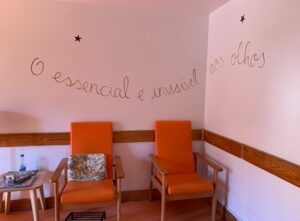
Santo António Senior Social Center’s Night Center Living Room 2. Photo by the author.
To conclude, I want to highlight the resulting communicability of unwellness, of being or feeling maldisposta, that is unique to the Santo António Social Senior Center. The interembodied experience(s) of aging in this center cannot be divorced from the various forms of familial, social, mental, and biological undoing brought on by the process of aging in an ever-increasing neoliberal Portugal with an ever-increasing elderly population, during a devastating pandemic. Feeling maldisposta at the Center is, then, a shared, interembodied affliction of gendered loss in the face of institutionalized care.
Though this phenomenon of feeling maldisposta is something specific to this elder care Center in which I conducted fieldwork, in the context of urban Portugal, each care space in every corner of the world also holds unique phenomena of interconnectedness, especially during infectious disease crises. This particular site of interembodiment and undoing in aging illuminates the universality of the complexities of illness, interpersonal relationships, neoliberal governance, and social inequality under glocal capitalisms that are lived and experienced by elders, their caregivers, and their families around the world during a deeply unsettling pandemic time – different as they may be from one another.
References
Bunkley, Emma Nelson. 2022. “Interembodiment, Inheritance, Intergenerational Health.” Medical Anthropology Quarterly 36 (2): 256-271.
Csordas, Thomas, J. 2008. “Intersubjectivity and Intercorporeality.” Subjectivity 22: 110–21.
Lock, Margaret. 1993. Encounters with Aging: Mythologies of Menopause in Japan and North America. Berkeley: University of California Press.
Moran-Thomas, Amy. 2019. “What Is Communicable? Unaccounted Injuries and “Catching” Diabetes in an Illegible Epidemic.” Cultural Anthropology 34: 471 01.
Niewöhner, Jörg and Margaret Lock. 2018. “Situating Local Biologies: Anthropological Perspectives on Environments/Human Entanglements.” BioSocieties 13: 681–97.
Pinto, Sarah. 2014. Daughters of Parvati: Women and Madness in Contemporary India. University of Pennsylvania.
Verónica Maria Pascoal Sousa is an Azorean Portuguese-American PhD candidate in Medical Anthropology at the Institute of Social Sciences, University of Lisbon, and an adjunct lecturer in Medical Anthropology at the University of Maryland, College Park. She has studied medical anthropology and literature at UC Berkeley, anthropology and gender and sexuality studies at The New School for Social Research, and anthropology at Princeton University prior to her doctoral program in Lisbon, Portugal. Her current doctoral research project, funded by the Science and Technology Foundation (FCT), concerns the negotiations between care and harm with a focus on the politics of social work, embodiment, touch, risk, grief, loss, and pharmaceuticals in elder care during the COVID-19 pandemic in Lisbon. She is interested in the ways that technologies and Catholic histories of care and social inequalities, particularly those related to gender, sexuality, race, disability/illness, and class, are entangled within the practice and experience of elder care in the urban Portuguese context.
Cite as: Sousa, Verónica. 2024. “Maldisposta: Feeling Unwell in Pandemic Times” In “Aging Globally: Challenges and Possibilities of Growing Old in an Unsettling Era,” edited by Magdalena Zegarra Chiappori, American Ethnologist website, 7 August 2024. [https://americanethnologist.org/online-content/maldisposta-feeling-unwell-in-pandemic-timesby-veronica-sousa/]
